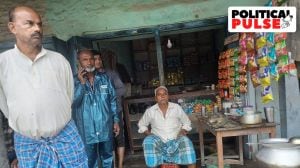Stay updated with the latest - Click here to follow us on Instagram
Voice of Dilli
1857 was an unsettling time to be in Delhi. Life,as Dilliwallas lived it,was changing fast. Gambling had been made illegal,as was the sale of opium.
Mahmood Farooquis book shows how ordinary residents
of Delhi lived out the 1857 uprising
1857 was an unsettling time to be in Delhi. Life,as Dilliwallas lived it,was changing fast. Gambling had been made illegal,as was the sale of opium. You couldnt play drums during Muharram and kite and pigeon flying was banned. Lead was contraband and one could be detained if caught travelling with it. These arresting vignettes and much more,are part of Besieged: Voices From Delhi 1857 (Penguin India,Rs 699),a work of compilation and translation by Mahmood Farooqui. The book is based on The Mutiny Papers,a collection of documents mainly dealing with Delhi in 1857 stored at the National Archives of India.
The ordinary people of Delhi were going through a momentous period in history says Farooqui. But the troubles and ordeals they faced have been appropriated in writing a national narrative,in legitimising the state, he says. They might not have wanted that narrative, he adds. Farooqui had embarked on the project of researching the papers at the insistence of writer William Dalrymple.
The papers had been accessed earlier by historians but not looked at with the respect they deserve, he says. A year of sifting and translating the archival documents written in shikastah (cursive) Urdu,and untold stories began to emerge from the depths of ordinary petitions,notifications and orders. So we learn that residents felt harassed as meat and vegetables got scarce,paan became too expensive and toilet cleaners stopped doing their work. A certain Mir Akbar Ali petitions the Mughal authorities,complaining against soldiers billeted in a neighbouring house who gamble,abuse and ogle at the women.
Soldiers,too,were not always a happy lot. A petition from a particular regiment shows the troops complain that they were not getting their quota of sugar syrup (sheerini) that other regiments seem to be getting. Women,too,enjoyed a surprising amount of freedom: a certain Bilasia is summoned by the court and asked whether she prefers her first husband or the second one she has recently married.
The archival documentation was mainly a colonial enterprise,done with the intention of gathering supporting evidence for the prosecution of Emperor Bahadur Shah Zafar. That does not mean that one should develop a sense of gratitude,says Farooqui,for when the British wrote our history,it was a subordinate history,a bastardised,inferior version of what was ideal. On June 23,1857,Indian soldiers in Delhi were observing the 100th anniversary of the Battle of Plassey, he says. A sense of history is something that was not necessarily given to us by the British, he adds.
Farooqui,credited with reviving dastangoi,the art of Urdu storytelling,is also interested in looking at the cultural repercussions of 1857. In fact,the setback that performance art suffered in particular might be the next subject he takes on. I would like to probe where characters like the bhaand (stand-up comics),naqqal (mimics),the art of tableaux and spectacles all disappeared, he signs off.







